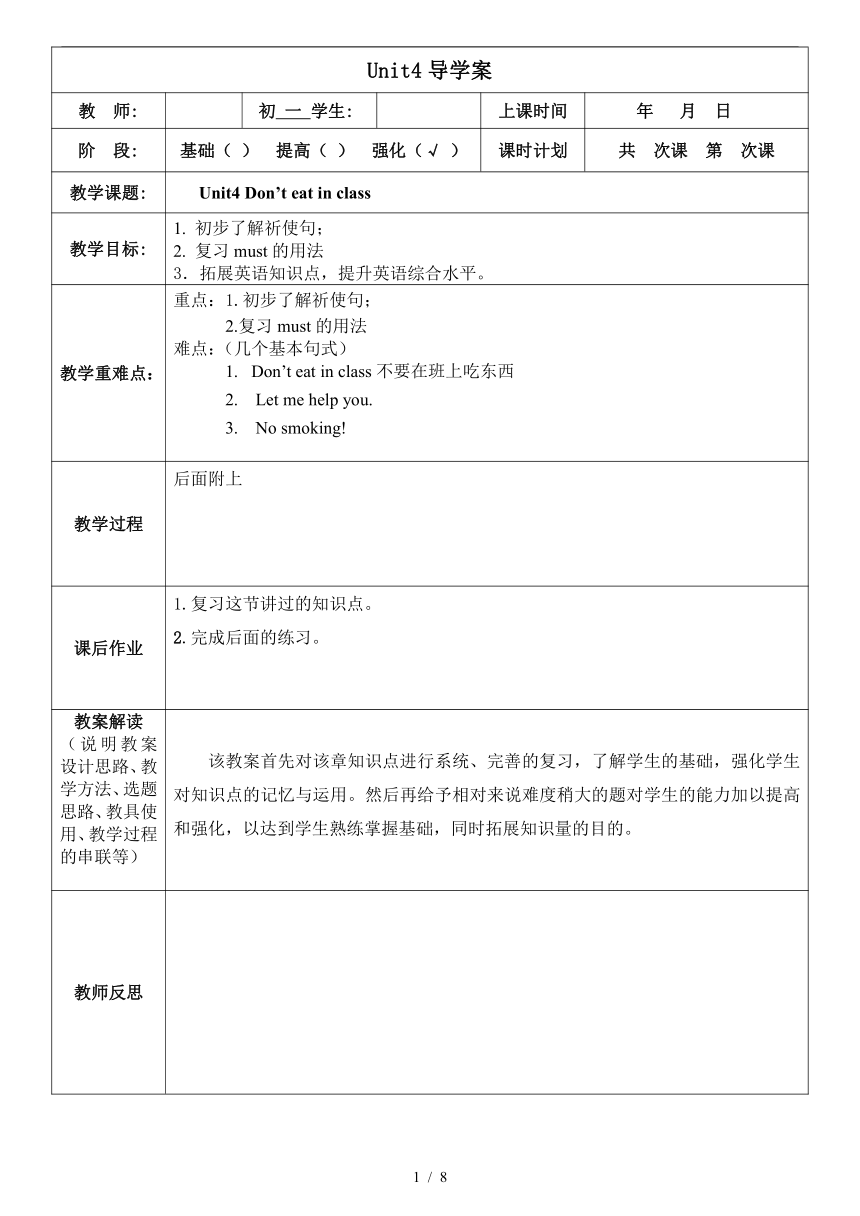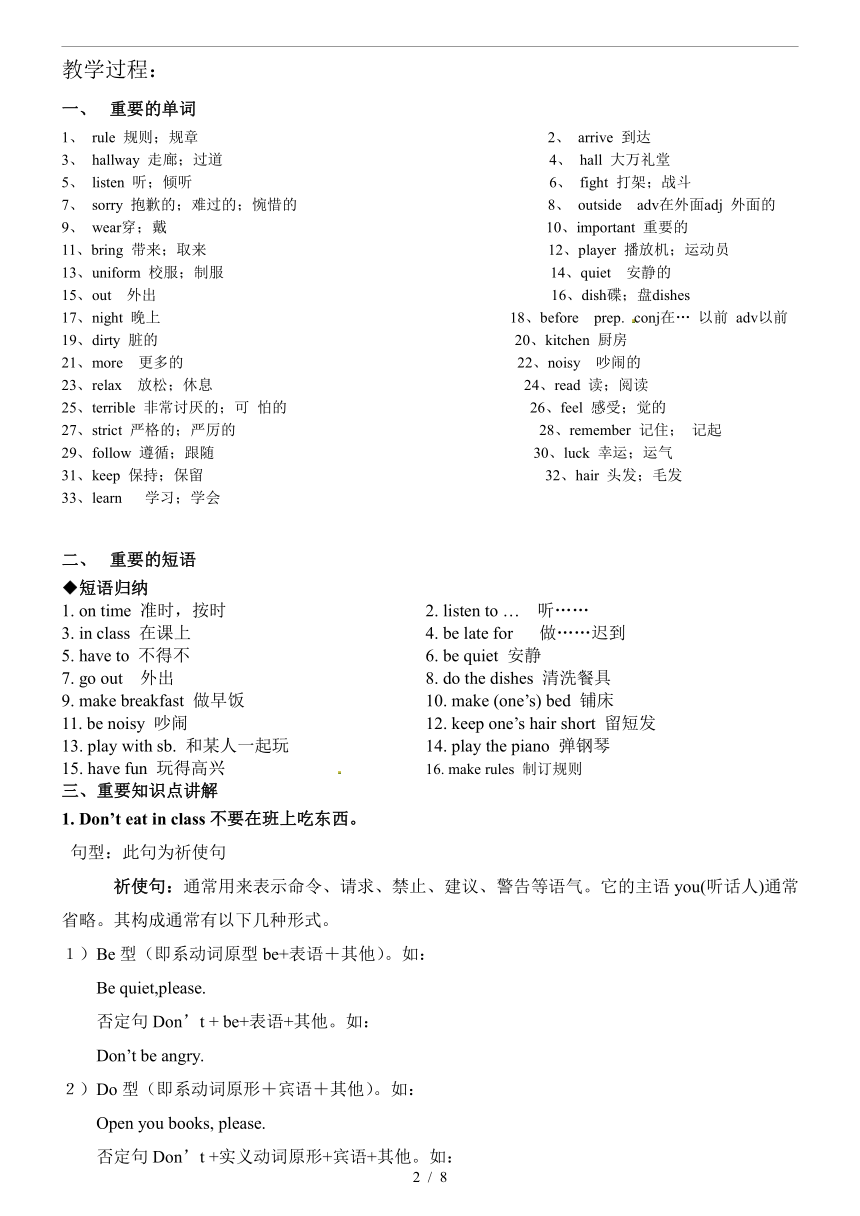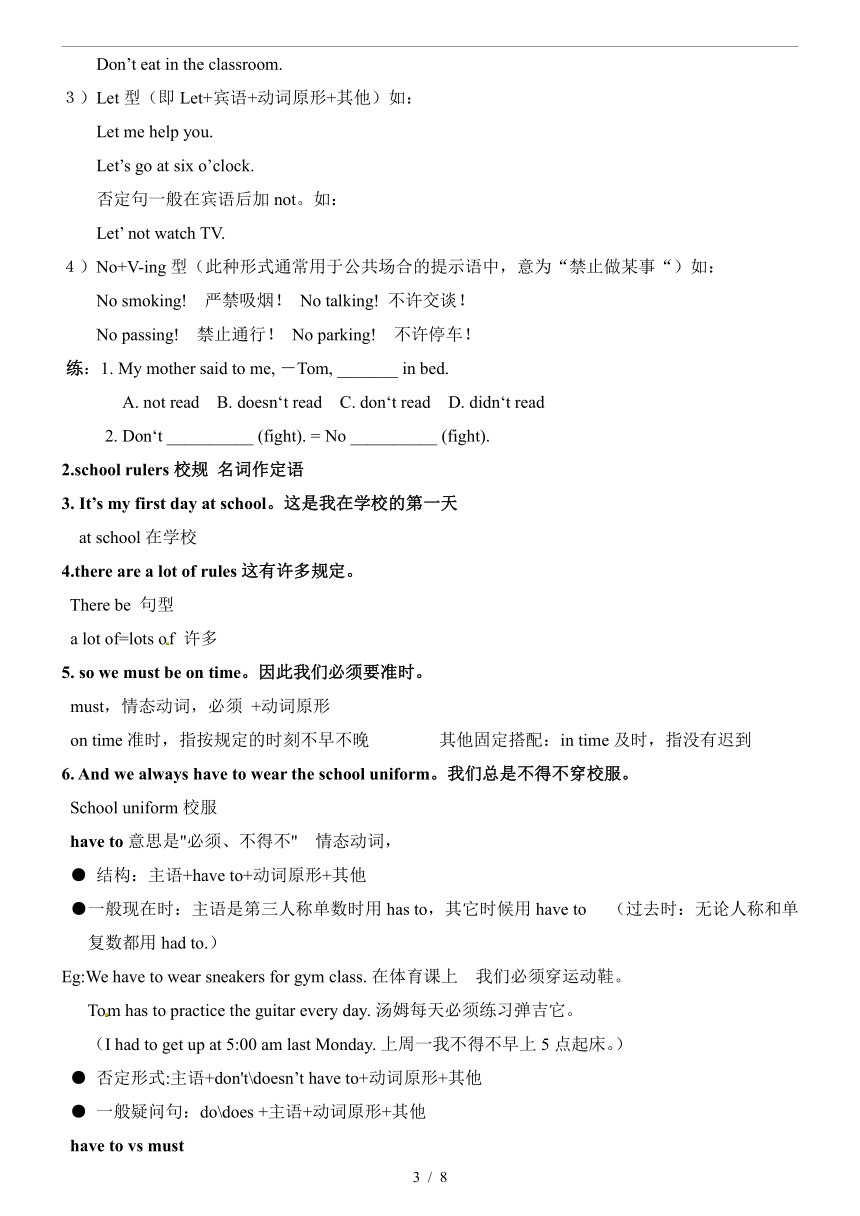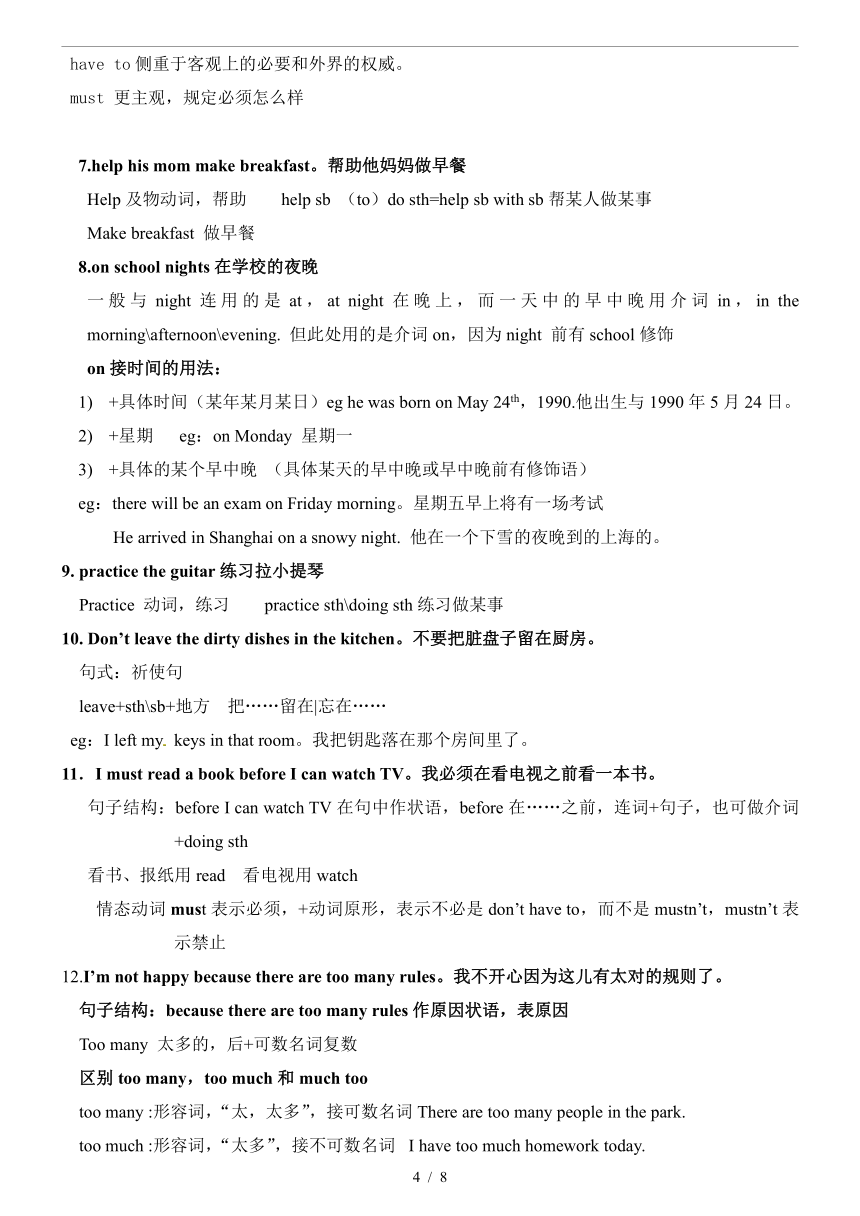Unit 4 Don’t eat in class 同步导学案 知识点+练习(无答案)
文档属性
| 名称 | Unit 4 Don’t eat in class 同步导学案 知识点+练习(无答案) |  | |
| 格式 | zip | ||
| 文件大小 | 140.6KB | ||
| 资源类型 | 教案 | ||
| 版本资源 | 人教新目标(Go for it)版 | ||
| 科目 | 英语 | ||
| 更新时间 | 2020-02-23 14:41:40 | ||
图片预览




文档简介
Unit4导学案
教 师: 初 一 学生: 上课时间 年 月 日
阶 段: 基础( ) 提高( ) 强化(√ ) 课时计划 共 次课 第 次课
教学课题: Unit4 Don’t eat in class
教学目标: 1. 初步了解祈使句;2. 复习must的用法3.拓展英语知识点,提升英语综合水平。
教学重难点: 重点:1.初步了解祈使句; 2.复习must的用法难点:(几个基本句式)Don’t eat in class不要在班上吃东西 2. Let me help you.3. No smoking!
教学过程 后面附上
课后作业 复习这节讲过的知识点。2.完成后面的练习。
教案解读(说明教案设计思路、教学方法、选题思路、教具使用、教学过程的串联等) 该教案首先对该章知识点进行系统、完善的复习,了解学生的基础,强化学生对知识点的记忆与运用。然后再给予相对来说难度稍大的题对学生的能力加以提高和强化,以达到学生熟练掌握基础,同时拓展知识量的目的。
教师反思
教学过程:
重要的单词
1、 rule 规则;规章 2、 arrive 到达
3、 hallway 走廊;过道 4、 hall 大万礼堂
5、 listen 听;倾听 6、 fight 打架;战斗
7、 sorry 抱歉的;难过的;惋惜的 8、 outside adv在外面adj 外面的
9、 wear穿;戴 10、important 重要的
11、bring 带来;取来 12、player 播放机;运动员
13、uniform 校服;制服 14、quiet 安静的
15、out 外出 16、dish碟;盘dishes
17、night 晚上 18、before prep. conj在… 以前 adv以前
19、dirty 脏的 20、kitchen 厨房
21、more 更多的 22、noisy 吵闹的
23、relax 放松;休息 24、read 读;阅读
25、terrible 非常讨厌的;可 怕的 26、feel 感受;觉的
27、strict 严格的;严厉的 28、remember 记住; 记起
29、follow 遵循;跟随 30、luck 幸运;运气
31、keep 保持;保留 32、hair 头发;毛发
33、learn 学习;学会
重要的短语
◆短语归纳
1. on time 准时,按时 2. listen to … 听……
3. in class 在课上 4. be late for 做……迟到
5. have to 不得不 6. be quiet 安静
7. go out 外出 8. do the dishes 清洗餐具
9. make breakfast 做早饭 10. make (one’s) bed 铺床
11. be noisy 吵闹 12. keep one’s hair short 留短发
13. play with sb. 和某人一起玩 14. play the piano 弹钢琴
15. have fun 玩得高兴 16. make rules 制订规则
三、重要知识点讲解
1. Don’t eat in class不要在班上吃东西。
句型:此句为祈使句
祈使句:通常用来表示命令、请求、禁止、建议、警告等语气。它的主语you(听话人)通常省略。其构成通常有以下几种形式。
1)Be型(即系动词原型be+表语+其他)。如:
Be quiet,please.
否定句Don’t + be+表语+其他。如:
Don’t be angry.
2)Do型(即系动词原形+宾语+其他)。如:
Open you books, please.
否定句Don’t +实义动词原形+宾语+其他。如:
Don’t eat in the classroom.
3)Let型(即Let+宾语+动词原形+其他)如:
Let me help you.
Let’s go at six o’clock.
否定句一般在宾语后加not。如:
Let’ not watch TV.
4)No+V-ing型(此种形式通常用于公共场合的提示语中,意为“禁止做某事“)如:
No smoking! 严禁吸烟! No talking! 不许交谈!
No passing! 禁止通行! No parking! 不许停车!
?练:1.?My?mother?said?to?me,?―Tom,?_______?in?bed.?
A.?not?read????B.?doesn‘t?read????C.?don‘t?read????D.?didn‘t?read?
2.?Don‘t?__________?(fight).?=?No?__________?(fight).?
2.school rulers校规 名词作定语
3. It’s my first day at school。这是我在学校的第一天
at school在学校
4.there are a lot of rules这有许多规定。
There be 句型
a lot of=lots of 许多
5. so we must be on time。因此我们必须要准时。
must,情态动词,必须 +动词原形
on time准时,指按规定的时刻不早不晚 其他固定搭配:in time及时,指没有迟到?
6. And we always have to wear the school uniform。我们总是不得不穿校服。
School uniform校服
have to意思是"必须、不得不"情态动词,
结构:主语+have?to+动词原形+其他?
●一般现在时:主语是第三人称单数时用has?to,其它时候用have?to?(过去时:无论人称和单复数都用had?to.)?
Eg:We?have?to?wear?sneakers?for?gym?class.?在体育课上?我们必须穿运动鞋。?????
Tom?has?to?practice?the?guitar?every?day.?汤姆每天必须练习弹吉它。????
(I?had?to?get?up?at?5:00?am?last?Monday.?上周一我不得不早上5点起床。)???
否定形式:主语+don't\doesn’t?have?to+动词原形+其他?
一般疑问句:do\does +主语+动词原形+其他
have to vs must
have to侧重于客观上的必要和外界的权威。
must 更主观,规定必须怎么样??
?
7.help his mom make breakfast。帮助他妈妈做早餐
Help及物动词,帮助 help sb (to)do sth=help sb with sb帮某人做某事
Make breakfast 做早餐
8.on school nights在学校的夜晚
一般与night连用的是at,at night在晚上,而一天中的早中晚用介词in,in the morning\afternoon\evening. 但此处用的是介词on,因为night 前有school修饰
on接时间的用法:
+具体时间(某年某月某日)eg he was born on May 24th,1990.他出生与1990年5月24日。
+星期 eg:on Monday 星期一
+具体的某个早中晚 (具体某天的早中晚或早中晚前有修饰语)
eg:there will be an exam on Friday morning。星期五早上将有一场考试
He arrived in Shanghai on a snowy night. 他在一个下雪的夜晚到的上海的。
9. practice the guitar练习拉小提琴
Practice 动词,练习 practice sth\doing sth练习做某事[来源:Z_xx_k.Com]
10. Don’t leave the dirty dishes in the kitchen。不要把脏盘子留在厨房。
句式:祈使句
leave+sth\sb+地方 把……留在|忘在……
eg:I left my keys in that room。我把钥匙落在那个房间里了。
11.I must read a book before I can watch TV。我必须在看电视之前看一本书。
句子结构:before I can watch TV在句中作状语,before在……之前,连词+句子,也可做介词+doing sth
看书、报纸用read 看电视用watch
情态动词must表示必须,+动词原形,表示不必是don’t have to,而不是mustn’t,mustn’t表示禁止
12.I’m not happy because there are too many rules。我不开心因为这儿有太对的规则了。
句子结构:because there are too many rules作原因状语,表原因
Too many 太多的,后+可数名词复数[来源:学科网]
区别too many,too much和much too
too?many?:形容词,“太,太多”,接可数名词?There?are?too?many people?in?the?park.?
too?much?:形容词,“太多”,接不可数名词? I?have?too?much?homework?today.?
much?too:?副词,“太,非常”,接形容词或副词?My?mother?is?much?too?busy.?
【典型例题】?
I?have?________skirts?and?this?one?is?________large?for?me, so?you?can?take?it?if?you?like.?
A.?too?many;?too?much???B.?too?much;?much?too???C.?too?many;?much?too?
13. Parents and schools are sometimes strict。父母和学校有时很严格。
Strict严格的 be strict with sb对某人要求严格
be strict in sth对某事要求严格
14.??辨析:?get?to/reach/arrive????到达
get?to+地点;
reach+地点
arrive?at+小地点(车站等);arrive?in+大地点(国家等)
?---What?time?did?the?team________the?top?of?the?mountain??---At?about?4:30?p.m.?
A. come??????????B. go?????????C. arrive???????????D. arrive?at?
15.??hear、listen和sound都有"听"的意思,但三者是有区别的:
hear"听说"?侧重于"听"的内容。
listen"听"侧重于"听"这一动作.?
sound"听起来"它是系动词?后面接形容词等。
?________carefully, or?you?are?not?able?to________anything.?(be?able?to?do?sth能够做…)?
A.Hear;listen???????B.Listen;hear??????C.Hear;listen??????D.Listen;listen?
16.??辨析take,bring?
take“带走,拿走”指把东西从说话地带到别的地方。
bring“带来”指把东西从别处带到说话地。
________away?this?dirty?shirt?and?________me?a?clean?one.?
A. Take; bring??????B. Take; take??????C. Bring; take??????D. Bring; bring?
17.?remember“记得,记住”,是及物动词,可以直接加名词。?remember?doing?sth记得已做某事(已做)remember?to?do?sth?记得要做某事(还没做)
?18.either,too与also?
either?“也”,用于否定句中,置于句末时用“,”隔开?I?won’t?go?there, either.?
too?“也”,用于肯定句句末,用“,”隔开?I?like?dancing, too.?
also?“也”,用于肯定句句中?I?also?like?English.?
【典型例题】?
I?don’t?like?her,?________.?
A. also?????????B. too?????????C. either????????D. to?
四: 重点句型:
句型:不得不/必须做某事:have?to?do?sth?否定:不必做某事:don‘t?have?to?do?sth?
例:We?have?to?wear?uniforms?at?school.??在学校我们必须穿校服
穿校服:单数:wear?a?uniform????复数:wear?uniforms?
练: ?–?I?can‘t?stop?smoking,?doctor.???
–?For?your?health,?I‘m?afraid?you?______.?
A.?can????B.?may????C.?must????D.?have?to.?
课堂练习:
Ⅰ:堆墙砌砖:
单项选择:(20分)
Usually they _________ rules, and we must follow ________.
A. make, it B. make, them C. makes, it D makes, them
2. --- _________ in the hallways. --- Sorry, sir.
A. Not run B. Don’t run C. Not running D. Don’t running
3. ---Does he like _____________ music? --- Yes, he does.[来源:Zxxk.Com]
A. listening to B. listen to C. listen D. listening
4. We _____________ in the classroom.
A. have to quiet B. have quiet C. have to be quiet D. have quiet to
5. Don’t ________ and don’t _________ in class.
A. eat, noise B. to eat, noisy C. to eat, noise D. eat, noisy
6. I am not happy because there are __________ rules and ___________ homework at home.
A. too many, too much B. too much, too many
C. too many, too many D. too much, too much
7. I think it’s best _____________ for Tom.
A. relax B. to relax C. relaxing D. relaxes
8. She ____________ school every day.
A. doesn’t have to come B. doesn’t has to come
C. doesn’t have to come to D. doesn’t has to come to
9. Molly can’t play soccer on school days, but she _________ play it on weekends.
A. can B. can’t C. must D. has to
10. Schools make rules ___________ us students, we must follow _______.
A. help, they B. to help, them C. help, them D to help, they[来源:Zxxk.Com]
三. 句型变换 (15分)
1. The boy has to get up early every morning. ( 一般疑问句)
___________ the boy ___________ __________get up early every morning?
2. I can sing and dance, too. ( 否定句)
I __________ sing _______ dance, _____________.[来源:学&科&网Z&X&X&K]
3. You can’t come late for school. ( 改为祈使句)
_________ _________ late for school.
4. She has no sister. ( 同义句)
She____________ _____________ ____________ sister.
5 I have to get up early and do my homework. ( 划线提问)
___________ __________ you _________ to do?
四. 用括号内单词的正确形式填空:(20分)
There’s too much _____________(noise) in the room, it’s too ____________(noise).
She ________________(do) the __________________(dish) every day.
There are too many _______________(rule) at school, some of them ________(be) strict.
He often ____________(feel) tied because he often _____________(relax) six hours a day.
He has to ______________(help) his mother________________(do) the housework.
五. 根据汉语提示,用英语词组完成句子。(10分)
1. You have to __________________(遵守规则) at school.
2. My teachers_______________________(对我要求严格).
3. You have to ________________________(学会阅读).
4. You can play football _______________________(晚饭前).
5. ____________ _____________ _______________(别出去) on school nights!
课后练习:
Ⅱ:芝麻开花节节高
一:.翻译句子
1.请听我说。????????????????????????????
2.安静!??????????????????????????????
3.不许在走廊里奔跑。??????????????????????????????????????
4.我们不能在教室里吃东西。????????????????????????????????
5.上体育课我们必须穿运动鞋。
6.??我们可以在餐厅吃东西,但是不可以在教室里?吃。
???????????????????????????????????????????????????????7.?他不必穿校服。??
??8.???我们可以在外面听音乐吗???
????? ???
二:用下面所给的单词完成短文,使句子的意思完整通顺,每词只用一次(10分)
and, has, are, his , can’t, strict , them, keep, either, bring
Mike is from America, now he is in a school in Beijing. There________ too many rules in his new school. Some of _______are the same as the ones in America. Such as” Don’t eat in class, don’t fight_________ don’t arrive late for school.” But he ________ stand( 忍受) some of the rules. In America, he usually gets up at 8:00, but he ________ to get up at 6:00 here. He has to wear ________ uniform at school and sports shoes for P.E. class. He likes music, but he can’t__________ his music player to school. He can’t ________ his hair long. And he can’t wear a hat in the classroom _______. He thinks the rules are too _________. He never has fun.
三. 任务型阅读理解,阅读短文,完成文后练习(10分)
Hello, boys and girls! Welcome to the school library! ① 但是我们这里有一些规矩。First, don’t talk. ② You can’t be nosy in the library. You have to be quiet here. Second, you can’t listen to music here. So you can’t bring your music player to the library. Third, ③you can’t bring your food to the library or eat it here. Fourth, you can’t take photos in the library.
You can borrow two books at a time and keep them for three weeks. You must give them back on time. If you lose(丢失) them, you have to pay for(赔付) them, have a good time here!
1. 将句子①译成英语。
2. 将句子②改成祈使句。
3. 将句子③译成汉语。
4. Can I listen to music in the library?
5. What do you have to do if you lose the library books?
PAGE / NUMPAGES
同课章节目录
- Unit 1 Can you play the guitar?
- Section A
- Section B
- Unit 2 What time do you go to school?
- Section A
- Section B
- Unit 3 How do you get to school?
- Section A
- Section B
- Unit 4 Don't eat in class.
- Section A
- Section B
- Unit 5 Why do you like pandas?
- Section A
- Section B
- Unit 6 I'm watching TV.
- Section A
- Section B
- Review of Units 1-6
- Unit 7 It's raining!
- Section A
- Section B
- Unit 8 Is there a post office near here?
- Section A
- Section B
- Unit 9 What does he look like?
- Section A
- Section B
- Unit 10 I'd like some noodles.
- Section A
- Section B
- Unit 11 How was your school trip?
- Section A
- Section B
- Unit 12 What did you do last weekend?
- Section A
- Section B
